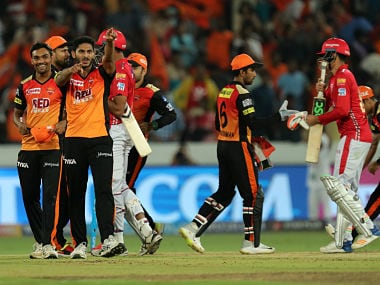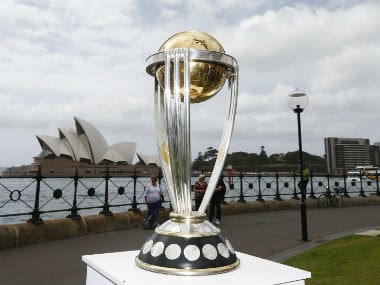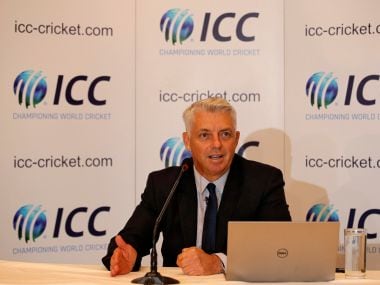IPL 2018: Gautam Gambhir made the right call by stepping down as Delhi Daredevils captain, but is it his responsibility alone?
The rot stems deeper at the Daredevils and there is a need to affix more responsibility, beyond Gautam Gambhir’s solo show that is.
Chetan Narula, April 26, 2018
T20 LEAGUE POINTS TABLE
| Pos. | Team | P | W | L | D | Pts. |
|---|---|---|---|---|---|---|
| 1 | Chennai |
6 | 5 | 1 | 0 | 10 |
| 2 | Hyderabad |
7 | 5 | 2 | 0 | 10 |
| 3 | Punjab |
7 | 5 | 2 | 0 | 10 |
| 4 | Kolkata |
6 | 3 | 3 | 0 | 6 |
| 5 | Rajasthan |
6 | 3 | 3 | 0 | 6 |
| 6 | Bangalore |
6 | 2 | 4 | 0 | 4 |
| 7 | Mumbai |
6 | 1 | 5 | 0 | 2 |
| 8 | Delhi |
6 | 1 | 5 | 0 | 2 |
- Bangladesh Women in South Africa, 5 ODI Series, 2018 SAW vs BANW - May 4th, 2018, 01:30 PM IST
- Bangladesh Women in South Africa, 5 ODI Series, 2018 SAW vs BANW - May 6th, 2018, 01:30 PM IST
- Bangladesh Women in South Africa, 5 ODI Series, 2018 SAW vs BANW - May 9th, 2018, 01:30 PM IST
- Bangladesh Women in South Africa, 5 ODI Series, 2018 SAW vs BANW - May 11th, 2018, 01:30 PM IST
- Bangladesh Women in South Africa, 5 ODI Series, 2018 SAW vs BANW - May 14th, 2018, 01:30 PM IST
- Bangladesh Women in South Africa, 3 T20I Series, 2018 SAW vs BANW - May 17th, 2018, 01:30 PM IST
- Bangladesh Women in South Africa, 3 T20I Series, 2018 SAW vs BANW - May 19th, 2018, 01:30 PM IST
- Bangladesh Women in South Africa, 3 T20I Series, 2018 SAW vs BANW - May 20th, 2018, 01:30 PM IST
- New Zealand Women in Ireland, Only T20I, 2018 IREW vs NZW - Jun 6th, 2018, 04:30 PM IST
- New Zealand Women in Ireland, 3 ODI Series, 2018 IREW vs NZW - Jun 8th, 2018, 03:00 PM IST
| Rank | Team | Points | Rating |
|---|---|---|---|
| 1 | India | 5313 | 121 |
| 2 | South Africa | 5154 | 117 |
| 3 | New Zealand | 3886 | 102 |
| 4 | Australia | 4599 | 102 |
| 5 | England | 5029 | 97 |
| 6 | Sri Lanka | 4374 | 95 |
| Rank | Team | Points | Rating |
|---|---|---|---|
| 1 | India | 7595 | 123 |
| 2 | South Africa | 6912 | 117 |
| 3 | England | 7496 | 117 |
| 4 | New Zealand | 7081 | 114 |
| 5 | Australia | 6376 | 112 |
| 6 | Pakistan | 4877 | 96 |
| Rank | Team | Points | Rating |
|---|---|---|---|
| 1 | Pakistan | 3763 | 130 |
| 2 | Australia | 2513 | 126 |
| 3 | India | 4341 | 121 |
| 4 | New Zealand | 3013 | 116 |
| 5 | England | 2402 | 114 |
| 6 | South Africa | 2551 | 111 |





In the 2013 edition of the Indian Premier League, Rohit Sharma took over the Mumbai Indians’ captaincy from Ricky Ponting. At that point in the season, Mumbai had played six matches, won three and lost three. Their last defeat had come against Delhi Daredevils, and placed Mumbai sixth in the nine-team table.
You could almost understand this decision. In those six matches, Ponting had scored 28, 6, 0, 14, 4 and did not bat in one, returning a paltry 52 runs (in 5 innings). For a batsman of his class and reputation, pride alone would have gnawed at Ponting and coerced him into this call. Indeed, Mumbai Indians’ fortunes soared thereafter as Rohit took charge and they went on to lift the trophy that year.
File picture of Gautam Gambhir. Sportzpics
After those six games, Ponting didn’t make another appearance for Mumbai in their title-march. It makes for some wonderment. For long, the merits of having an international player as IPL captain have been hotly debated. If it is a current player, at the peak of his powers, say David Warner (until last season) or Kane Williamson now, it is an easily acceptable proposition. Yet, IPL history is littered with instances where players of repute, who have been long past their best, have been handed captaincy only to see a change around in plans mid-season.
Virat Kohli replacing Daniel Vettori (Royal Challengers Bangalore, 2012) and Steve Smith replacing Shane Watson (Rajasthan Royals, 2015) are obvious examples. Then, there are other instances where the ‘international skipper’ is displaced because he is taking up one of the four much-valued overseas spots in lieu of being captain. Anil Kumble (replacing Kevin Pietersen at Royal Challengers Bangalore, 2009) and Murali Vijay (replacing David Miller at Kings XI Punjab, 2016) are such instances.
So when Gautam Gambhir announced his decision to step down as Delhi Daredevils’ captain on Wednesday afternoon, the understandable reasoning was a fine balance between the two aforementioned pointers. His return from the first six games – 85 runs inclusive of 55 in his first outing – was central to this decision. He has scored 30 runs in 4 innings since the loss to Punjab in Delhi’s opening game.
Therein, comes the selection debate. No, this isn’t about handing Gambhir the captaincy. Returning home, and based on his winning record at Kolkata Knight Riders, it was the right appointment for the Daredevils who have lacked a leadership figurehead for long. That it hasn’t worked out is a disappointing fact.
Moreover, in a bid to break away from their continued downward spiral, the Daredevils have tried to play around with combinations. Colin Munro was dropped, Jason Roy came and impressed but got injured, and then Prithvi Shaw was introduced as a fourth opener in six games. For someone who sets a high moral standard in all things he does, it is easy to assume that occupying a batting spot with a low return in terms of runs was the major factor in Gambhir’s decision.
A captain needs to be the first deserving name on the team sheet. How do you do that with a highest of 15 in the last four games? Of course, it doesn’t help matters that Ponting is in the Daredevils’ camp and there has been ample talk about how Gambhir has been nudged (or pushed) into making this decision.
On his part though, Gambhir has denied all these claims, backed by Ponting and the Daredevils’ team management in this matter too. So much so that he penned a column in Thursday’s Times Of India, and his words can be mostly seen as a bid to absolve Ponting of all the blame. “While I was writing this I was getting a sense that a certain section of the media was seeing Ponting as a trigger for my decision to step down. I don’t know where is it coming from. Maybe Aussie-bashing is the flavour of the season!” he wrote.
It is often said that the simplest explanation is the most relevant and honest one. Yet, in the media business, this adage simply doesn’t work. In the hunt for headlines and TRPs, it is easy to assume that the one with a microphone in his hand (or their hands) are not always talking true. The question to ponder over here is, what if they are?
What if Gambhir indeed heard the voice in his head and decided to step down, an unprecedented move for an ‘Indian’ captain in the IPL? Sure, there have been past instances where an Indian leadership has been changed in this tournament – Adam Gilchrist replaced VVS Laxman (erstwhile Deccan Chargers, 2008) and Darren Sammy replaced Shikhar Dhawan (Sunrisers Hyderabad, 2014). Even so, they were forced changes, brought about by the team management and not induced by the player in question as in this case.
And this precisely why Ponting’s praise for Gambhir shouldn’t go unnoticed. “Taking a call like this isn't heard of in India. For someone of his stature and cricketing record, to take a decision like this is incredible. He deserves a lot of credit. I did the same thing when I was a player for Mumbai Indians. I knew that I had better players that I was keeping out of the side," said the former Australian captain on Wednesday, after Gambhir’s announcement.
For a moment then, forget all the conspiracy theories (mostly about how Australian coaches don’t treat Indian cricketers well) and take things at face value. At this juncture, you will find the urge to get some answers. Is the captain alone responsible for his team’s results, especially in a franchise tournament where the coach has a lot of say in how things shape up?
It fixes the spotlight firmly on Ponting. He was Mumbai Indians’ coach from 2014 to 2016, wherein they reached the playoffs in 2014, won in 2015 but couldn’t defend their title in 2016 (finishing fifth). He parted ways with Mumbai after that, but that stint kick-started Ponting’s coaching career – so much so that he is now a front-runner for the Australian team’s job. In turn then, shouldn’t there be some responsibility fixed on his shoulders if Daredevils fail to improve their results in the coming weeks?
Perhaps even more responsibility lies at the doorstep of the Daredevils’ team management. CEO Hemant Dua has held the reins of this franchise since 2012. Thereafter, Daredevils have been the perennial holders of the wooden spoon, finishing last twice (2013 and 2014), not to mention in the lower half of the table every season for the last five years (and on course to repeat this performance in 2018).
In that interim, the likes of Mahela Jayawardene (2013), Kevin Pietersen (2014), JP Duminy (2015) and Zaheer Khan (2016 and 2017 with Karun Nair also leading last year) have failed to turn around the Daredevils’ fortunes. None of them were fired mid-season or nudged into giving up their assured spots in the playing eleven.
Maybe, just maybe then, the rot stems deeper at the Daredevils and there is a need to affix more responsibility, beyond Gambhir’s solo show that is.
Updated Date:Apr 26, 2018
Also See
IPL 2018: From lack of team effort to lapses in concentration, five reasons for Delhi Daredevils' poor start to the season
IPL 2018: Gautam Gambhir steps down as Delhi Daredevils captain; Shreyas Iyer to lead struggling side
IPL 2018: Delhi Daredevils hope to get back to winning ways against Kings XI Punjab in first home game